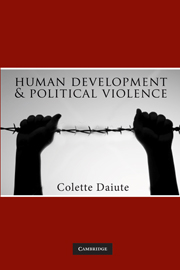Book contents
- Frontmatter
- Contents
- List of Figures
- List of Tables
- Preface
- 1 Beyond the Youth Gap in Understanding Political Violence
- 2 Youth and Society Work Together
- 3 Living History
- 4 Critical Narrating
- 5 Participation Matters
- 6 Sociobiographies
- 7 Human Development in Conflict
- Appendix: Examples of Public Stories across Positions in the DSTY Research Workshop
- References
- Index
4 - Critical Narrating
Published online by Cambridge University Press: 05 June 2012
- Frontmatter
- Contents
- List of Figures
- List of Tables
- Preface
- 1 Beyond the Youth Gap in Understanding Political Violence
- 2 Youth and Society Work Together
- 3 Living History
- 4 Critical Narrating
- 5 Participation Matters
- 6 Sociobiographies
- 7 Human Development in Conflict
- Appendix: Examples of Public Stories across Positions in the DSTY Research Workshop
- References
- Index
Summary
When the nation itself struggles for identity and political stability, those in power exert pressure on citizens to express certain ideas and not others. Pressure to speak in ways that justify a war or prove that the country is moving beyond a violent past, for example, may affect the powerless in society, including young people and minorities, because they have not been privy to decisions governing these discourses. As discussed in Chapter 3, scripts by young people narrating conflicts among adults organize mundane events consistent with societal circumstances. Young people have the right to critique violence in their society, yet it is in just such circumstances that critique is dangerous and narrating becomes a cunning enterprise. With the understanding that youth, like nations, can use story-telling, in part, to manage their relations in society, the DSTY research workshop includes a fiction-writing activity (see Figure 2.6). In this story, Moira, a 19-year-old in Croatia, played with a political script:
The Greens and the Blues created this center in order for it to be the main place for social development of our town. The Greens were ready to do everything. They didn't mind the fact that the Blues participated in some other community centers in other towns. The Blues were loyal to the Greens as much as they were to the other partners. They had enough time and will to be active in many places. The news they told the Greens destroyed everything. With time, the Greens showed they weren't open for cooperation with others. […]
- Type
- Chapter
- Information
- Human Development and Political Violence , pp. 113 - 147Publisher: Cambridge University PressPrint publication year: 2010



